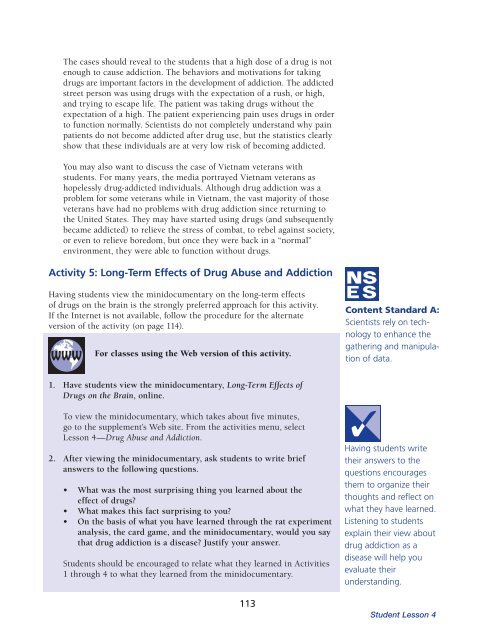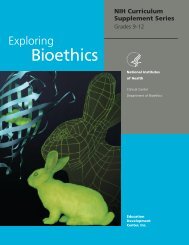Drug Abuse And Addiction - NIH Office of Science Education
Drug Abuse And Addiction - NIH Office of Science Education
Drug Abuse And Addiction - NIH Office of Science Education
You also want an ePaper? Increase the reach of your titles
YUMPU automatically turns print PDFs into web optimized ePapers that Google loves.
The cases should reveal to the students that a high dose <strong>of</strong> a drug is notenough to cause addiction. The behaviors and motivations for takingdrugs are important factors in the development <strong>of</strong> addiction. The addictedstreet person was using drugs with the expectation <strong>of</strong> a rush, or high,and trying to escape life. The patient was taking drugs without theexpectation <strong>of</strong> a high. The patient experiencing pain uses drugs in orderto function normally. Sci entists do not completely understand why painpatients do not become addicted after drug use, but the statistics clearlyshow that these individu als are at very low risk <strong>of</strong> becoming addicted.You may also want to discuss the case <strong>of</strong> Vietnam veterans withstudents. For many years, the media portrayed Vietnam veterans ashopelessly drug-addicted individuals. Although drug addiction was aproblem for some veterans while in Vietnam, the vast majority <strong>of</strong> thoseveterans have had no problems with drug addiction since returning tothe United States. They may have started using drugs (and subsequentlybecame addicted) to relieve the stress <strong>of</strong> combat, to rebel against society,or even to relieve boredom, but once they were back in a “normal”environment, they were able to function without drugs.Activity 5: Long-Term Effects <strong>of</strong> <strong>Drug</strong> <strong>Abuse</strong> and <strong>Addiction</strong>Having students view the minidocumentary on the long-term effects<strong>of</strong> drugs on the brain is the strongly preferred approach for this activity.If the Internet is not available, follow the procedure for the alternateversion <strong>of</strong> the activity (on page 114).For classes using the Web version <strong>of</strong> this activity.Content Standard A:Scientists rely on technologyto enhance thegathering and manipulation<strong>of</strong> data.1. Have students view the minidocumentary, Long-Term Effects <strong>of</strong><strong>Drug</strong>s on the Brain, online.To view the minidocumentary, which takes about five minutes,go to the supplement’s Web site. From the activities menu, selectLesson 4—<strong>Drug</strong> <strong>Abuse</strong> and <strong>Addiction</strong>.2. After viewing the minidocumentary, ask students to write briefanswers to the following questions.• What was the most surprising thing you learned about theeffect <strong>of</strong> drugs?• What makes this fact surprising to you?• On the basis <strong>of</strong> what you have learned through the rat experimentanalysis, the card game, and the minidocumentary, would you saythat drug addiction is a disease? Justify your answer.Students should be encouraged to relate what they learned in Activities1 through 4 to what they learned from the minidocumentary.113Having students writetheir answers to thequestions encouragesthem to organize theirthoughts and reflect onwhat they have learned.Listening to studentsexplain their view aboutdrug addiction as adisease will help youevaluate theirunderstanding.Student Lesson 4
















